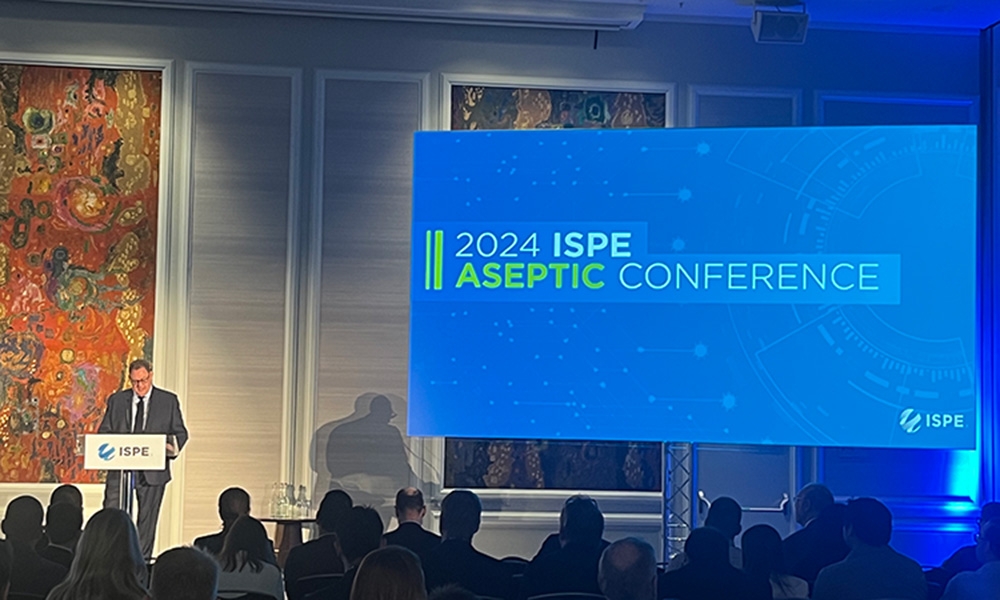Change & New Realities Set the Stage

Day One Recap of the 2019 ISPE Annual Meeting & Expo
Change is a constant in the pharmaceutical industry. Improving the ways in which the industry changes can help develop and deliver therapies to patients. Speakers at the Opening Plenary of the 2019 ISPE Annual Meeting & Expo in Las Vegas, Nevada on Sunday afternoon 27 October brought home ways to move forward.
Over 1,650 attendees at the Annual Meeting heard messages of hope, improvement, determination, and innovation during the Opening Plenary. Making innovation effective and productive in developing and producing drugs with costs that are within patients’ reach is the next step for the industry, noted speakers at the plenary.
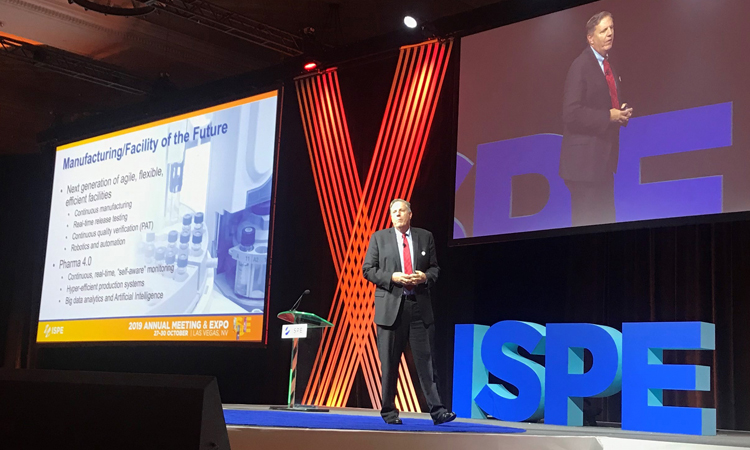
The industry is experiencing great change in a number of areas, as James Breen Jr., Vice President, Project Lead, Biologics Expansion at Janssen Pharmaceuticals and Chair of the ISPE Board of Directors pointed out in opening the plenary session. These include:
- Precision medicine, including personalized, on demand experience; growth and importance of biologics; CAR-T and cell and gene therapy
- Market access opportunities, affected by middle class expansion in emerging markets; aging population growth; and continued evolution of global fulfillment channels
- Manufacturing/facility of the future, including agile, flexible and efficient facilities with continuous manufacturing, real-time release testing, continuous quality verification, and robotics and automation; and Pharma 4.0
- Workforce of the future: training is needed to accommodate growth in biologics and other innovations, for Pharma 4.0, and in anticipation of workforce shortages.
- The innovation imperative. This includes entrepreneurial partnerships and mindsets, activating collaborative ecosystems, and learning from other industries. The goal is to achieve faster progress.
“At the end of the day, all of this is about serving the patient,” Breen said.
New ISPE Strategic Plan
John Bournas, President and CEO of ISPE, welcomed attendees to the Annual Meeting & Expo, noting that “Vegas is a city of dreams,” and the industry has gathered for the Annual Meeting & Expo with the hope of sharing collective knowledge to continue to facilitate and develop pharmaceutical excellence and next-generation quality medicines. He observed that “hope is the common theme of all the presentations” at the Annual Meeting.
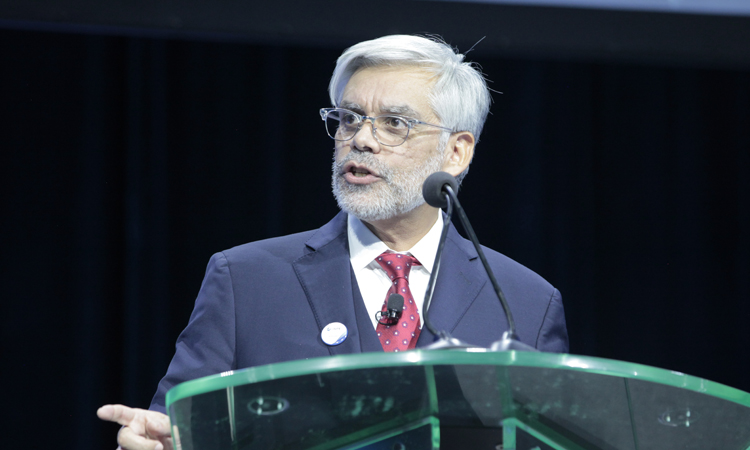
To support these trends and developments in the industry, ISPE has developed a new three-year Strategic Plan. Bournas provided an overview. ISPE’s new Strategic Plan was created with the input of over 1,600 individuals who participated in surveys, focus groups, and interviews. Participants included individual members and nonmembers, Chapters, Affiliates, knowledge networks, the ISPE International Board of Directors, and former Board members.
ISPE’s Mission Statement
“ISPE is the global industry leader in connecting pharmaceutical knowledge to deliver manufacturing and supply chain innovation, operational excellence and regulatory insights to enhance industry efforts to develop, manufacture and reliably deliver quality medicines to patients.”
ISPE’s Vision Statement
“Provide solutions to complex pharmaceutical industry challenges through manufacturing innovation, member and workforce development, technical, regulatory, and compliance collaboration.”
Highlights from the strategic themes to fulfill and support the Mission and Vision of ISPE in the new plan include:
- Build and Scale Content and Initiatives Relevant to Current and Emerging Therapeutic Modalities. ISPE’s focus is on thought leadership driving innovative solutions for pharmaceutical manufacturing, supply chain operations, regulatory compliance, and quality assurance. ISPE is the go-to organization in technical problem solving for continuous and agile manufacturing of current and emerging therapeutic modalities (biotech (large molecules); small molecules; and cell and gene therapies). ISPE continues to drive digital transformation of manufacturing/data analytics through Pharma 4.0.
- Balance Portfolio of Programs, Products, and Services to Optimize ISPE’s Mission-Related Initiatives. This includes a more structured approach to alignment with the Strategic Plan.
- Lead the Acceleration of the Pharmaceutical Industry’s Efforts to Develop the Workforce
- of the Future.
- Drive Member Value with Targeted Content, Communications, and Member Experiences Based on Professional Areas of Interest and Demographics. This includes geographic-specific content and also Young Professionals as well as continuing sponsorship of the Global Pharmaceutical Manufacturing Leadership Forum (GPMLF).
- Design and Implement Global Digital Transformation Initiative for Content Development, Knowledge Management, Access, and Distribution. Continued modernization of ISPE’s digital platforms and more engagement of subject-matter experts and regulators in content are part of this strategic theme.
- Foster Partnerships and Collaborations That Advance ISPE’s Mission.
- Improve Relevance, Impact, and Efficiency of ISPE’s Volunteer Operations.
- Promote and Support the ISPE Foundation. Bournas encouraged members to support the Foundation and its work, which includes travel grants for attendees at the first-ever Annual Meeting Hackathon, as well as Women in Pharma activities including the new Mentor Circles.
Patient Perspective
The next plenary presenter was Jessica H., who shared her story of diagnosis and now living with multiple sclerosis. In “Thriving in My New Normal,” she shared her journey as a patient who became an advocate for herself through the challenges of obtaining an accurate diagnosis, and then into a trial of Ocrevus.
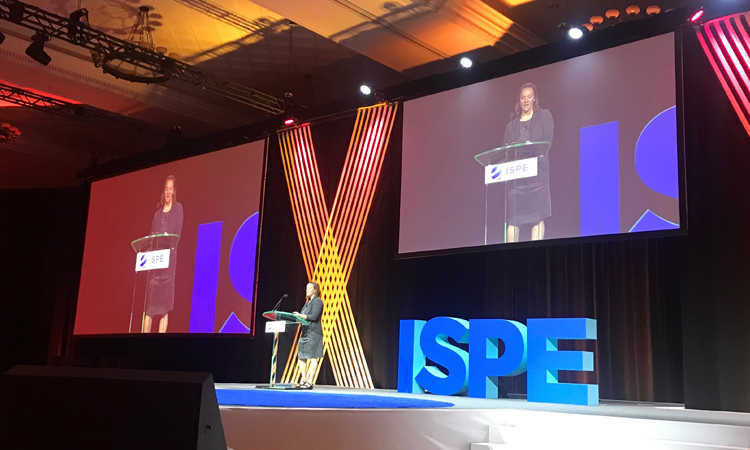
After experiencing random and intermittent symptoms including numbness, spasticity, and difficulty enunciating words over several months, she sought treatment from her primary care physician and emergency room doctors. None could identify anything abnormal and suggested alternative issues such as anxiety or acid reflux. Finally Jessica decided to document what was happening to her and to become her own advocate—a “new normal” —including trying to live a healthy life and manage stress. Her symptoms continued and she was finally able to get assessed by a neurologist she once worked for. The doctor conducted a neck MRI and concluded that she likely suffered from relapsing MS. Follow up imaging confirmed that she has relapsing-remitting MS.
She was advised to pursue fast treatment to slow the progression and to try to prevent relapses. Jessica was accepted as a medication trial participant for a treatment already approved by the FDA, Ocrevus. The drug helps slow the progression of MS. It is administered via infusion twice a year after initial dosage, which was appealing to Jessica for allowing her to lead a more normal lifestyle. Since starting the drug, she has suffered no relapses and with preventative measures taken before infusions, she has not had side effects.
After the first year post-diagnosis, Jessica was ready to share her experiences, and is committed to living her life fully. “Life is 10% what happens to you, 90% how you react to it,” she said. She focuses on getting adequate sleep, eating well, and exercising often, including continuing to enjoy cycling and playing sand volleyball.
Living with MS “is a battle but I do not let it consume me. I continue to be my own advocate and every day stand in my truth. I live with MS” but she works to rise above it. “I do not let it define me.”
Leadership Changes for Faster Outcomes
Patients such as Jessica provide inspiration for the industry to do what it does faster and better in order to transform patients’ lives, noted Bill Anderson, Chief Executive Officer, Roche Pharmaceuticals. In his presentation, “Every Patient Matters—Transforming to Deliver Breakthroughs Faster,” he talked about transformation of a somewhat different type: while transforming science is important, transforming leadership is necessary. “Without this, the science won’t matter.”

He noted the challenge of medication affordability is a growing problem. “We need to figure out how to make the medicines at a much lower burden on society. That’s where transformational leadership comes in.” This will be needed to deal with coming challenges including many rare diseases that still have no therapies, many around the world have no access to healthcare, and the challenge posted by an aging population.
Exciting developments in pharma including cyclic peptides; LNA technology; bi/multi specifics that engage and activate T cells to kill tumor cells; port delivery system (delivering an antibody to the eye); and programmed T cells offer tremendous hope for a number of diseases. However, they may not solve cost needs for patients, he said.
A lot of encouraging developments are coming, he said, but “unfortunately, it is not enough.” Over 20 years, small biotech companies have out-returned large pharma companies by 4 times, he said.
When he was named CEO of Genentech three years ago, commitment to the mission and science and helping patients was strong, but large bureaucracy issues were getting in the way. So the company decided to start over with different approaches.
For instance, instead of devoting six months to planning, budgeting, and establishing targets, Genentech decided to remove budgets and targets and cut back on planning to focus on simply getting the job done. “That does not mean there is no accountability,” Anderson explained. “There’s more, since there is no safe zone. We said, ‘you have three jobs: advance medical progress, take care of customers and patients, and make good use of company’s resources. Do those things and we’ll talk about how you did later.’” After two and a half years, he noted that spending went down.
Another step was cutting the size of teams: instead of a team of 10, the company asked employees to make a team of three or five, and empowered the teams to make decisions. Preliminary results include 50% more molecules in pivotal stage than three years ago—with the same head count. He said there were many examples of rapid acceleration of molecules: the company spent 13 years trying to improve time on filings. Last year, they cut five weeks off for about a 20% reduction due to team structure.
“We have not only the opportunity but also a sacred obligation to continue our mission,” Anderson said. “We harness best of science and technology, but are remaking ourselves in leadership.” He suggested that companies stop old, slow, and expensive ways to be able to produce great medicines at prices that patients can afford. Stop doing old way of slow and expensive. Society needs great medicines but at prices that patients can afford.
Lessons From Family-Owned Businesses
Another take on how to make the most of pharmaceutical companies in developing and delivering drugs came from Pierre-Alain Ruffieux, PhD, Head of Global Technical Operations at Roche Pharmaceuticals. In “Transforming Big Pharma Manufacturing: Dream or Reality?” he talked about the family-owned business model as a driver of getting to “fast and good” results. Shareholders, people, and resources will enable those results, he said.

Shareholders. Family-owned business does better in the long term because there is a clear owner, no obsession with share price, encourages preservation of capital, and applies family values. There is long-term perspective by family shareholders, the company can access data at scale, and can deliver value to patients and providers. Family shareholders care about environmental impact, and want sustainable growth rather than fast growth.
People. Give people space to create value in their own way: investigate the science. Access to quality metrics catalyzes appropriate action. Focus on millennials, who are the future. Flexible governance, empowerment with accountability, can lead to saving time.
Resources. Investing in innovation is important, even if there is sometimes failure. The more resources for innovation, the greater the amount of success that can follow.
New Ideas for Workforce Training
The challenge of building the workforce of the future is facing the industry, and creative thinking about solutions was shown in the presentation “Training Tomorrow’s Workforce.” Lou Kennedy, CEO and Owner, Nephron Pharmaceuticals, shared some approaches that are working well for her company.
Nephron, which received a FOYA 2017 Honorable Mention, is a mid-sized company with a traditional focus on generics, with a recent 503b sterile compounding/outsourcing business added in recent years to help fill drug shortage needs. Training the workforce was an important part of diversifying.
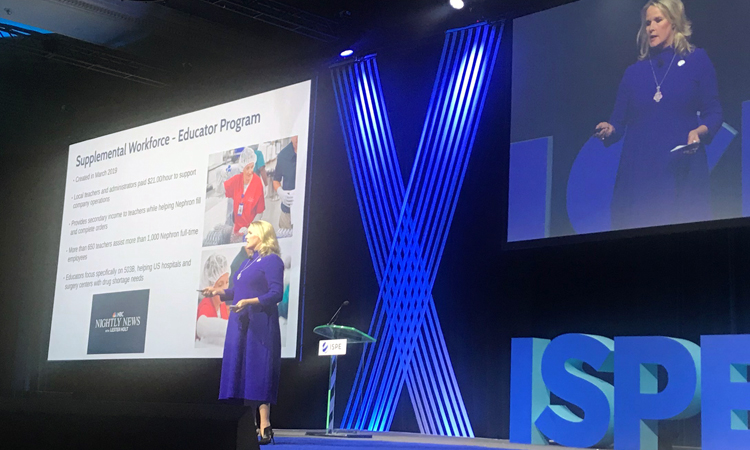
Training is a basic at Nephron: 503B regulations require cGMP, so everyone is trained on cGMP annually. The company has about 1,100-1,200 full time employees now, plus part timers in various training programs. Every new hire attends a two-week training boot camp that addresses all departments in the company. This ensures efficiency and consistency, Kennedy said. Exams are given each day, and SOPs reviewed and completed. Employees learn skills to manage technology instead of manual labor.
To expand the workforce, Nephron established several apprenticeship programs to reskill and retrain adults and to bring young people into the industry at an early age:
- Sterile pharma technician teaches students proper pharmacy operations under the supervision of a registered pharmacist. The 14-month program increases income for participants by 30% or more from the start to end of the program.
- Sterile pharma tech is for high school juniors who start a dual enrollment program with Midlands Tech College and Nephron; apprentices become licensed pharma techs before they graduate from high school.
- Mechatronics is a certificate program that prepares students to work in a 21st century automated environment. There is dual enrollment with Midlands Tech College and Nephron, providing valuable skills to enter the workforce after high school
- A new program with the only school in her state that offers instrumentation training has been added.
- A donation to the pharmacy school at a local university enabled courses on aseptic techniques to be established.
Nephron established a supplemental workforce educator program in March 2019, which employs local teachers and administrators on a part-time basis to support company operations. The program provides secondary income to teachers, and helps the company fill and complete orders. More than 650 teachers assist more than 1,000 full-time employees. These workers focus specifically on the 503B work, helping US hospitals and surgery centers with drug shortage needs, and has greatly improved speed in this area, Kennedy said.
“We’re doing everything we can to solve the drug shortage program,” she said. “It is a grass roots approach! It works.” The program has had an added benefit: teachers who go back to their classrooms to help train students and focus them on science career opportunities.


